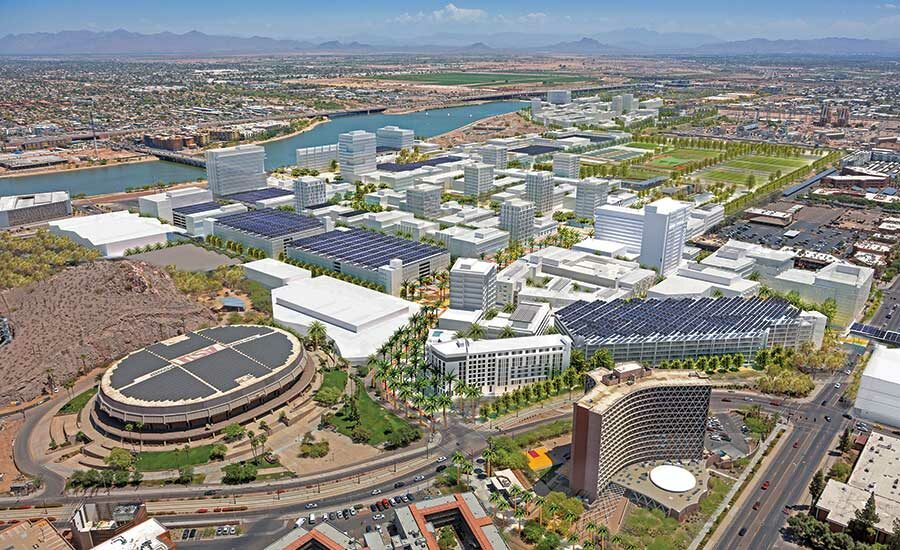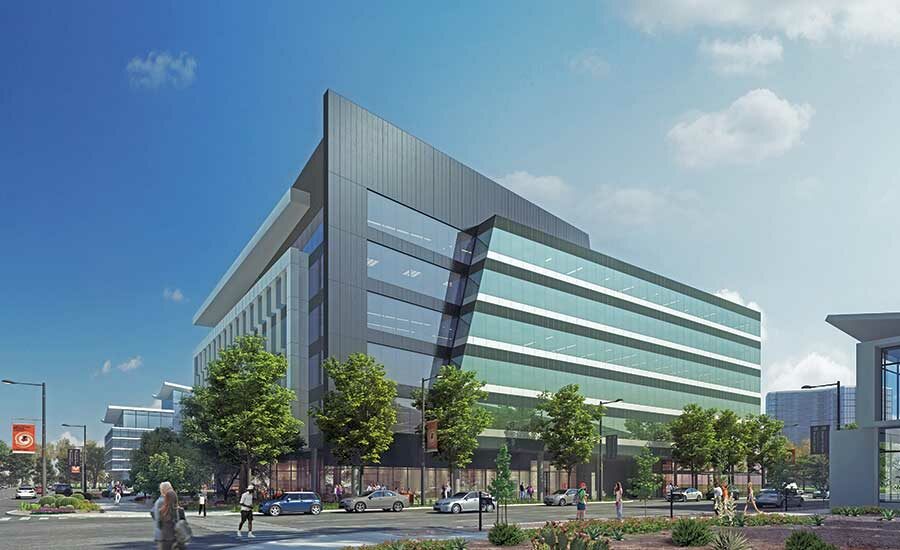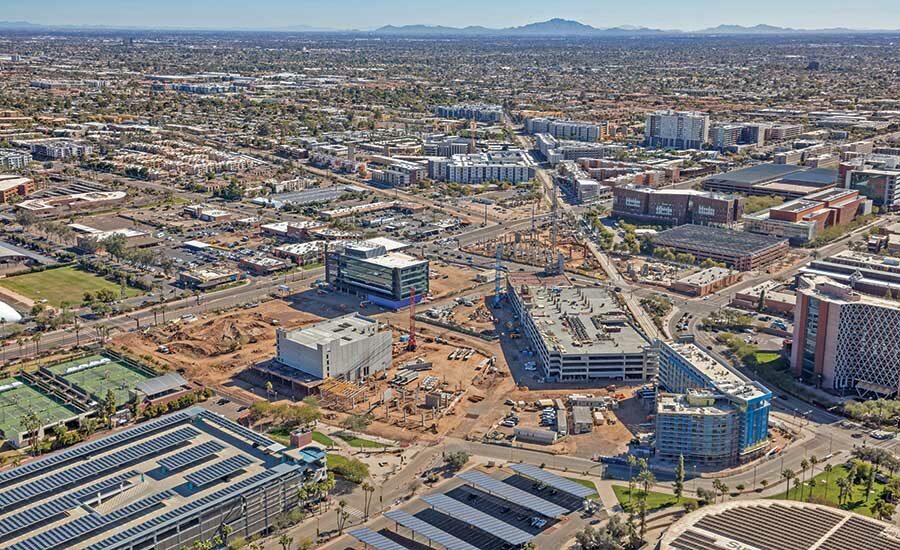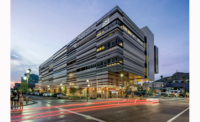Arizona State University, Developers Create Unique Partnerships in Tempe

Novus Innovation Corridor, located adjacent to an existing ASU stadium (foreground), will fund maintenance and construction of university sports venues, chiefly from ground leases by corridor developers.
IMAGE BY SASAKI, COURTESY OF NOVUS INNOVATION CORRIDOR

Occupants of the 777 Novus Tower office building, being developed and constructed by Ryan Cos., are seeking synergy with ASU’s vast research community.
IMAGE COURTESY OF DAVIS

In total, the Novus Innovation Corridor, portions of which are already under construction, could generate more than 25,000 permanent jobs, according to developers’ estimates.
PHOTO COURTESY OF NOVUS INNOVATION CORRIDOR



One of nation’s largest public universities is launching a real estate venture worthy of its size. Working in partnership with the Tempe, Ariz., office of Catellus Development Corp., Arizona State University is developing an 11-million-sq-ft urban district intended to capitalize on the university’s thriving research center and Tempe’s bustling commercial and residential markets.
The development, known as the Novus Innovation Corridor, seeks to transform a 355-acre university-owned parcel into 3.5 million to 4 million sq ft of office space, 3,000 to 3,500 units of multifamily housing, 250,000 to 400,000 sq ft of retail and dining space and 1,200 hotel rooms.
Currently under construction are a six-story, 160,000-sq-ft office building and a 151,000-sq-ft, 259-room hotel in addition to a 318-unit multifamily housing development and a parking structure—all part of the first phase to break ground. ASU also considers an adjacent 2017 development, Marina Heights, a 2.1-million-sq-ft regional hub for State Farm Insurance, to be an early component of the development.
Complete build-out in the Novus Innovation Corridor is expected to occur over a period of 15 to 20 years, says John Creer, vice president, real estate development with ASU. Work conceivably could finish sooner, should the project attract large-scale occupants, says Charley Freericks, senior vice president with Catellus, charged with marketing Novus to developers. “And we’re already nearly five years into the project,” he says.
Both Catellus and ASU are promoting potential partnerships between the university and private enterprise to drive development at Novus. According to some estimates, the completed development will create 25,000 permanent jobs. “We are the largest research university in the country,” says Morgan Olsen, executive vice president, treasurer and CFO at ASU. “Companies may want to work with us to license new technologies.”
Many firms also may view Novus as an ideal location for workforce recruitment. “In addition to 23,000 students studying engineering, we have 13,000 students studying business,” Olsen says. In all, the ASU Tempe campus houses more than 50,000 students.
Among other advantages, Novus also is sited at the northeast edge of campus, near downtown Tempe and its nightlife, shopping and dining options. The innovation corridor also is close to sports facilities, a light rail system and Tempe Town Lake, one of Arizona’s leading recreational venues.
Need for Alternative Funding
ASU’s foray into real estate development is in part a matter of necessity, the result of diminishing state funds for university operations, Olsen says. However, a 2010 state initiative to create districts for athletic facilities at Arizona’s three state universities allows private developers to build on university land, which is exempt from property taxes.
As planned, ASU will use the funds from assessments and ground leases generated by Novus to develop an athletic village near the Novus parcel, where existing football and basketball stadiums are located. As a result, “Novus will allow us to maintain and construct sports facilities for our 23 sports programs,” Olsen says. Those include the ASU Sun Devils’ football, basketball and baseball teams.
“Companies may want to work with us to license new technologies.”
– Morgan Olsen, EVP, Treasurer and CFO, ASU
Upon undertaking the Novus partnership, “ASU recognized it wasn’t in the business of real estate development,” Creer says. “We knew we needed to partner with a development firm with experience in the public sector as well as a firm well versed in long-term projects—and with the financial wherewithal to participate in a project of this scope.”
Catellus filled the bill, he says.
In addition to recruiting other developers, Catellus is charged with overall planning, securing entitlements, designing and installing infrastructure, negotiating 99-year prepaid ground leases on behalf of ASU and administering design reviews for each Novus project.
For its part, ASU has proved a formidable partner in attracting developers, chiefly by discussing potential partnerships with prospective tenants, Freericks says. Among others, the project has attracted the Phoenix office of Ryan Cos., developer and builder of 777 Novus Tower, the six-story office building currently under construction.
Upon completion this year, one of the project’s main tenants, Infosys, a business consulting, information technology and software engineering firm, plans to partner with ASU, says John Strittmatter, chairman, Southwest region, with Ryan Cos. “We also view the project as a means of strengthening our relationship with ASU,” he says, noting that Ryan Cos. has worked on several projects with the university, including development of Marina Heights.
“Tempe has one of the lowest office vacancy rates in the greater Phoenix area, thanks to the affiliation many companies have with ASU,” he adds. Ryan Cos. plans to participate in future phases of Novus.
Hotels, Offices, Apartments
The Novus team also is working with Mortenson, builder and developer of the current hotel project, due for completion later this year. Mortenson is building the hotel as a turnkey project, meaning it will sell the property upon its completion, according to George Forristall, director of real estate development with Mortenson. The buyer, Apple Hospitality REIT, Richmond, Va., will operate the hotel under the Hyatt flag for both Hyatt House and Hyatt Place.
“We thought the site was a great location for a hotel,” says Forristall, who notes the hotel is rising at one of Novus’ entry points, in close proximity to the football and basketball arenas as well as the ASU campus. Accordingly, Mortenson anticipates it will attract sports fans and families of students, in addition to business travelers.
“We see it as a strong venue for both weekend and weekday use,” Forristall says. In all, the hotel complex will contain 154 Hyatt Place units and 105 Hyatt House units, each equipped with kitchens for extended stays.
Austin, Texas-based Aspen Heights, developer of the apartment complex, plans to complete the project in 2021. “We anticipate the housing primarily will attract young professional singles and couples who wish to live in close proximity to where they work,” Freericks says. Meanwhile, Catellus intends to round out the phase by developing a pair of office facilities totaling about 320,000 sq ft, he says.
All Novus projects are being built in accordance with provisions of a master plan developed by Watertown, Mass.-based architect Sasaki and Tempe-based Architekton. While Sasaki conceptualized the master plan, including thoroughfares and the location of public and private spaces, Architekton helped to tailor the plan to the Sonoran Desert environment.
“The overall objective is to create walkable urbanism,” says Martin Zogran, principal with Sasaki. “Tempe lent itself well to the concept.” Key features include a six-block stretch of mixed uses, with sidewalk shading provided by trees, he says.
The master plan calls for a tight, compact urban fabric, meaning buildings with very little, if any, space between them that would allow sun—and heat—to penetrate the development, says John Kane, founding partner and design principal with Architekton. Additional criteria exclude east-west building orientations to the extent possible and incorporate exteriors that won’t fade, including unpainted concrete masonry units and metal, Kane adds. The scheme also promotes locating retail and dining venues at street levels of office and multifamily buildings. Architekton is reviewing submittals to ensure they meet guidelines.
Although the completed Novus development will eventually appear as a seamless urban setting, it was conceived as four adjoining neighborhoods for purposes of planning, according to Freericks. Each neighborhood will include office, retail, dining and residential space, much as the current phase does.
However, future phases may contain only some of these uses, then infill with others based on market demand, Freericks says. Upon completion, Novus will include bike paths, urban parks and pedestrian promenades. Catellus says Novus currently ranks as the largest urban commercial development opportunity in Arizona.





